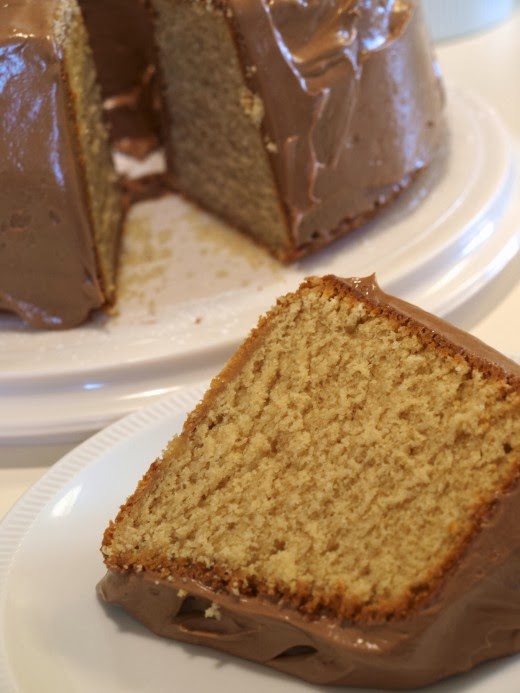Sometimes there is nothing better than a glass of milk and a slice of pound cake. A pound cake's dense texture can satisfy almost anyone's sweet tooth.
Pound cakes are one of my favorite desserts to make because they are usually not too sweet and a small piece goes a long way. They are also easy to take to parties and are always a crowd pleaser.
Peanut butter is another favorite of mine, and many other people, and peanut butter pound cake makes for one of the best treats you will ever eat.
This recipe produces a dense, not too sweet, pound cake that packs plenty of peanut butter flavor. It is also rich and moist.
For a simple, traditional pound cake, just sprinkle some powdered sugar on top and serve. For even more peanut butter flavor, add a peanut butter frosting. For those of you who love peanut butter and chocolate together, add chocolate to the frosting for a taste that can't be beaten.
Whichever way you choose to serve this cake, you will not be disappointed.
Peanut Butter Pound Cake
Yields: 12 - 16 slices
Ingredients:
- 1 cup butter, softened
- 2 cups sugar
- 1 cup light brown sugar, lightly packed
- 1/2 cup peanut butter, creamy or crunchy
- 5 eggs, room temperature
- 1 tbsp vanilla
- 3 cups flour, all purpose
- 1/2 tsp baking powder
- 1/2 tsp salt
- 1/4 tsp baking soda
- 1 cup milk, whole or low fat
Directions:
- Preheat the oven to 325°. Prepare a large tube or bundt pan by greasing and flouring it. Set pan aside. Update: A couple people have commented that their cake overflowed while baking. This recipe makes a large cake and I used a large tube pan. Only fill your bundt/tube pan up about 3/4 full. Don't let the extra batter go to waste though, make some muffins or a small loaf.
- In a large bowl, mix flour, baking powder, salt and baking soda. Set aside.
- On medium speed, cream together butter and sugar until fluffy. Add the brown sugar and peanut butter and continue mixing. Add the eggs, one at a time. Wait until one egg is fully mixed in before adding the next one. Add vanilla.
- Add the dry ingredients and the milk to the creamed mixture. Alternate between the flour mixture and the milk, using about a fourth of the ingredient at a time. Always begin and end with the dry ingredients. Mix completely.
- Pour the batter into the prepared pan and bake for 60 - 70 minutes. Start checking to see if it is done at 60 minutes using a wooden toothpick. Continue checking every 5 minutes to make sure it does not overcook. When the toothpick comes out clean, the cake is done.
- Remove from the oven and let it sit for 15 minutes. Then remove it from the cake pan and cool completely on a wire rack.
- Dust with powdered sugar or frost as desired.
- Note that this recipe makes a large cake. For smaller pound cakes, use loaf pans or even mini bundt cake molds. Adjust the cooking time accordingly since they will not need as much time to bake.
Peanut Butter Frosting Recipe
Ingredients:
- 1/2 cup butter, softened
- 1 cup peanut butter, creamy
- 2 cups powdered sugar
- Milk (amount varies based on consistency desired)
Directions:
Cream butter and peanut butter.
Add powdered sugar and milk while mixer is set on low. Add the milk one tablespoon at a time until you are happy with the consistency.
Pour over the top of the cake.
For Chocolate Peanut Butter Frosting, melt 4 ounces of semisweet chocolate squares, cool slightly, and add to the butter and peanut butter mixture. Proceed with the rest of the instructions.
Don't worry if the frosting is too thick or thin, just add small amounts of milk to thin, or powdered sugar to thicken.
How to prepare a cake pan
One of the keys to a successful cake is preparing the pan correctly. Everyone has had a cake stick at one time or another and it is not fun.
Make sure your cake pan is completely clean. Using a paper towel or a piece of wax paper, spread a layer of shortening on the inside of the pan. Coat the entire inside of the pan, including any crevices found on fancier pans. Don't forget the center of tube/bundt pans.
Pour in a generous amount of flour and carefully spread it around the entire pan. You'll need to roll the pan around a lot. Do this over the sink because the flour will spill out. Tap pan to get flour to spread around. To get the center of tube pans, pour a little flour on your hand and sprinkle where needed. Tap out excess flour.
Make sure that every area is covered. If you miss a spot, just use your finger to add a little shortening and tap the pan to cover with flour. If there is a corner where there is too much flour, tap it out so the cake does not bake with a lump of flour in one corner.
Even if your pan says it has a non-stick coating, take the time to prepare it. Cakes tend to stick to any pan. There are other things people use, like sprays, or the wrappers from sticks of butter, but after many years of baking, the method above has never let me down.
